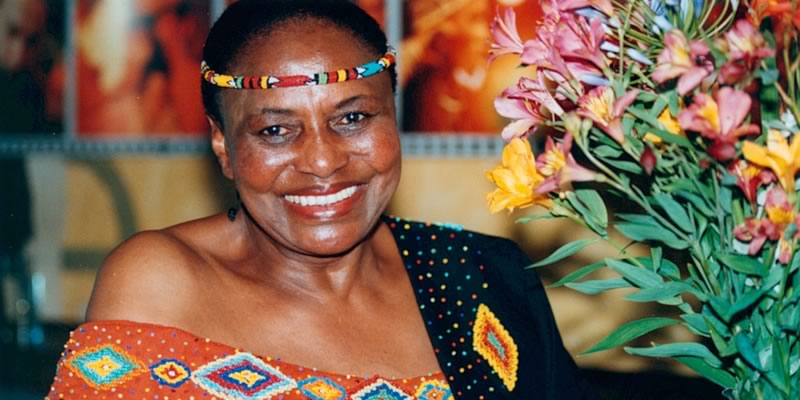South African Miriam Makeba dies at 76


The 76-year-old Singer and activist collapsed on stage Sunday night after singing one of her most famous hits “Pata Pata,” in a concert for Roberto Saviano, a writer threatened with death by the Mafia over his expose “Gomorrah.” Her last performance was a half-hour set alongside other singers and artists. The Pineta Grande clinic in Castel Volturno, near the southern city of Naples, said Makeba died early Monday of a heart attack. Her grandson, Nelson Lumumba Lee, was with her as well as her longtime friend, Italian promoter Roberto Meglioli, the Associated Press reports.
Makeba’s publicist, Cape Town-based Marc le Chat, has confirmed that the singer had been struggling with arthritis over the past years but had still been accepting key live dates.
“Whilst this great lady was alive she would say: ‘I will sing until the last day of my life’,” her family said in a statement.
“Her haunting melodies gave voice to the pain of exile and dislocation which she felt for 31 long years. At the same time, her music inspired a powerful sense of hope in all of us,” Mandela said in a statement
Makeba was well known throughout the world as the Mama Africa and the Empress of African Song. The first African woman to win a Grammy award, Makeba started singing in Sophiatown as a featured vocalist with the Manhattan Brothers in 1954, a cosmopolitan neighborhood of Johannesburg that was a cultural hotspot in the 1950s before its black residents were forcibly removed by the apartheid government. She later formed her own group, the Skylarks while touring Southern Africa with Alf Herberts’ African Jazz and Variety.
In 1959, Makeba’s incredible voice help win her the role of the female lead in the show, King Kong, a Broadway-inspired South African musical. That same year, she starred in the anti-apartheid documentary “Come Back, Africa,” which led to a meeting with Harry Belafonte, who helped Makeba gain entry to the United States. In 1963 she testified about apartheid before the United Nations. The South African government responded by banning her records, including hits like “Pata Pata,” “The Click Song” (“Qongqothwane” in Xhosa), and “Malaika” and revoking her citizenship and right of return.
Her close relationship with Belafonte opened up new opportunities including a performance for President Kennedy at his birthday party in 1962. In 1966, Makeba received the Grammy Award for Best Folk Recording together with Belafonte for “An Evening With Belafonte/Makeba.” The album dealt with the political plight of black South Africans under apartheid. But she fell briefly out of favor when she married Black Panther activist Stokely Carmichael — later known as Kwame Ture — and moved to Guinea in the late 1960s.
Miriam Makeba’s return to global prominence
Makeba returned to world prominence when she performed with Paul Simon on the Graceland tour. After three decades abroad, she was invited back to South Africa as a free South African by Mandela. The anti-apartheid icon, shortly after his release from prison in 1990 as white racist rule crumbled. “It was like a revival,” she said about going home. “My music having been banned for so long. People still felt the same way about me was too much for me. I just went home and I cried.”
In an interview with Britain’s Guardian newspaper earlier this year she said “People think I consciously decided to tell the world what was happening in South Africa. No! I was singing about my life, and in South Africa. We always sang about what was happening to us especially the things that hurt us.”
Makeba announced her retirement three years ago. But despite a series of farewell concerts she never stopped performing. When she turned 75 last year, she said she would sing for as long as possible.
Makeba is survived by her grandchildren, Nelson Lumumba Lee and Zenzi Monique Lee, and her great-grandchildren Lindelani, Ayanda, and Kwame.
Share your favorite Miriam Makeba song and memory.







Responses